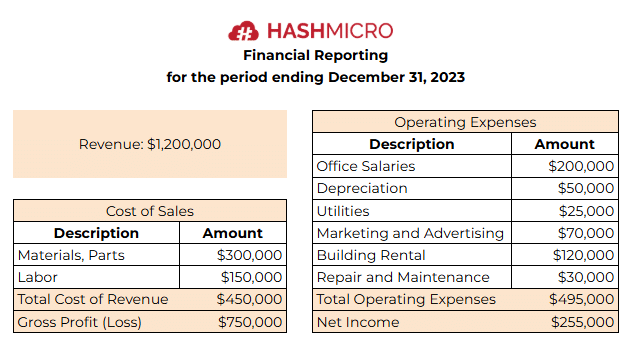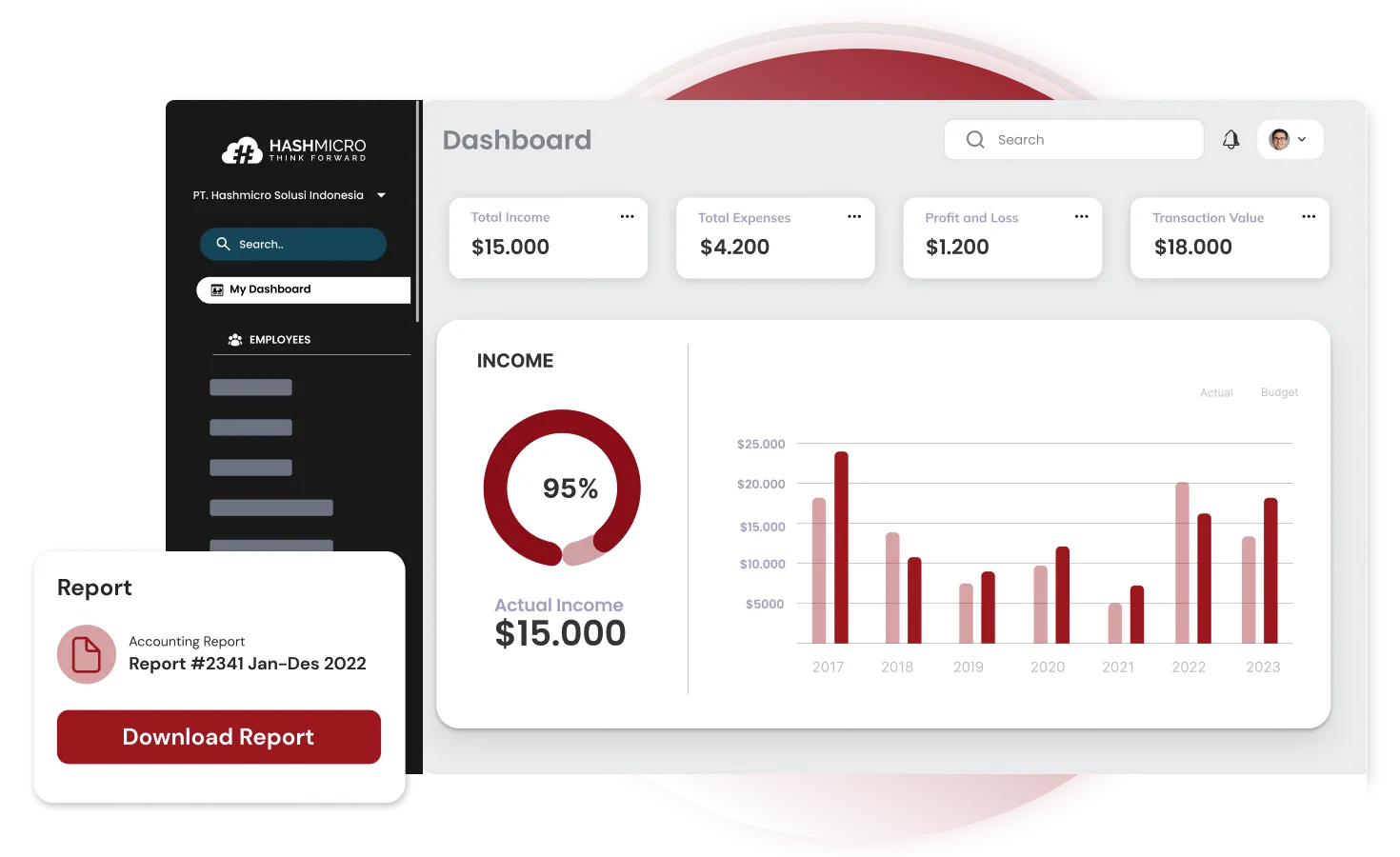Financial reporting is the cornerstone of sound decision-making and regulatory compliance. Accurate reporting also enables companies to identify growth opportunities and manage risks efficiently, ensuring long-term sustainability.
Nearly 46% of respondents reported that manually creating or modifying reports is time-consuming. Therefore, adopting an accounting system is crucial, as it automates these processes and improves efficiency.
Implementing HashMicro Accounting Software is ideal for businesses looking to enhance financial reporting. With automated report generation, real-time data tracking, and seamless integration, HashMicro ensures accuracy, reduces manual effort, and accelerates decision-making.
In this article, we’ll explore what financial reporting entails, why it’s crucial for businesses in Singapore, and how implementing the right accounting system can revolutionize your reporting process.
Table of Content:
Table of Content

Key Takeaways
|
What is Financial Reporting?
Financial reporting is the process of documenting a company’s economic activities, such as income and cash flow, over a specific period. It involves creating structured reports like balance sheets and income statements to provide stakeholders with clear insights for informed decision-making.
Typically, financial reports are produced quarterly or annually and used by various stakeholders, including company executives, shareholders, regulators, and the public.
The primary goal of this reporting is to offer a precise and transparent view of a company’s financial standing, performance, and cash flow. These insights are crucial for stakeholders as they guide investment, management, and long-term strategy decisions.
Companies enhance their credibility by ensuring transparency and accountability through financial reporting, potentially attracting more investment and growth prospects.
For-profit businesses prepare balance sheets, income, cash flow, and equity change statements. Nonprofits use similar reports with different names, reflecting their financial activities differently.
How Financial Statements Work
Financial statements help internal and external parties assess a company’s performance and financial health. Investors, analysts, and creditors use these reports to evaluate earnings potential and make informed decisions.
Key financial statements include the balance sheet, income statement, and cash flow statement, which provide insights into a company’s assets, profitability, and liquidity. These reports are typically found in annual reports and offer reliable, audited financial data.
Different accounting standards apply to financial reporting. U.S. companies follow Generally Accepted Accounting Principles (GAAP), while many international firms use International Financial Reporting Standards (IFRS). Government agencies may also have distinct reporting rules.
The Main Goals of Financial Reporting
Financial reporting is vital in documenting and analyzing a company’s economic activities. It helps businesses maintain transparency, track financial movements, and evaluate performance for strategic decision-making. Below are the three primary goals of financial reporting:
1. Providing accurate financial information to stakeholders
The financial statement provides structured data on revenue, expenses, assets, and liabilities through balance sheets and income statements. It helps stakeholders assess profitability, stability, and financial health for informed decisions.
2. Tracking financial transactions and business performance
By recording financial activities, businesses can monitor cash flow, detect irregularities, and maintain operational consistency. Cash flow statements track money movement, ensuring proper budgeting and liquidity management.
3. Analyzing financial trends for strategic planning
Financial reports reveal trends by comparing past and present performance. Businesses analyze profitability, debt, and revenue to manage risks, allocate resources, and plan for growth.
By fulfilling these goals, financial reporting enhances corporate accountability, improves risk management, and supports long-term business growth. Adopting an accounting system ensures accurate, timely data, automates tasks, and streamlines reporting, enabling businesses to focus on growth and financial transparency.
Key Types of Financial Reports
Understanding the different types of financial reports is essential for comprehensive business analysis and strategic decision-making. These financial reporting components collectively paint a detailed picture of a company’s financial health and operational success. Here, we explore the four types of financial reporting:
1. Balance sheet
The balance sheet provides a snapshot of a company’s financial status at a given moment, listing its assets, liabilities, and shareholders’ equity. Assets represent what the company owns, liabilities show what it owes, and shareholders’ equity indicates the owners’ residual interest after settling liabilities.
This report is essential for evaluating financial stability and liquidity. It offers insights into the company’s ability to meet short-term debts and utilize long-term assets. Below is a breakdown of the items in a balance sheet.
Assets
- Cash and Cash Equivalents – Readily available funds, including bank deposits and short-term investments.
- Accounts Receivable – Outstanding payments from customers for delivered goods or services.
- Inventory – Products or materials held for sale or production.
- Prepaid Expenses – Advance payments for future expenses, such as rent or insurance.
- Property, Plant, and Equipment (PPE) – Long-term assets like buildings, machinery, and land.
- Intangible Assets – Non-physical assets like patents, trademarks, and goodwill.
Liabilities
- Accounts Payable – Outstanding payments to suppliers and service providers.
- Wages Payable – Salaries and wages owed to employees.
- Short-Term Debt – Loans or obligations due within a year.
- Long-Term Debt – Financial obligations such as mortgages or bonds are due beyond one year.
- Dividends Payable – Declared dividends yet to be paid to shareholders.
Shareholders’ Equity
- Common Stock – Initial capital invested by shareholders.
- Retained Earnings – Profits reinvested into the business rather than distributed as dividends.
- Additional Paid-in Capital – Excess funds received from issuing shares beyond their nominal value.
2. Profit and loss statement (income statement)
The income statement, or profit and loss statement, outlines a company’s revenue, costs, and expenses over a specific period. It reveals how revenue is converted into net income, providing insights into the company’s profitability and operational efficiency.
Revenue
Revenue represents the total income generated from business activities before deducting expenses. It is a key indicator of a company’s ability to generate sales and sustain operations.
- Operating Revenue – Income earned from core business activities, such as product sales or service fees.
- Non-Operating Revenue – Additional income from secondary sources, including interest earnings, investments, or asset sales.
Expenses
Expenses refer to the costs incurred in running the business. Managing expenses efficiently is crucial for maintaining profitability.
- Cost of Goods Sold (COGS) – Direct costs related to producing goods or services, such as raw materials and labor.
- Operating Expenses – Ongoing costs required to maintain operations, including rent, salaries, marketing, and utilities.
- Non-Operating Expenses – Costs unrelated to core operations, such as interest payments on loans or one-time charges.
Businesses can assess financial performance by analyzing the income statement, identify cost-saving opportunities, and make informed strategic decisions.
3. Cash flow statement
The cash flow statement template provides an overview of the company’s cash inflows and outflows during a reporting period. Unlike the profit and loss statement, which is based on accrual accounting, the cash flow statement shows actual cash movements, providing insights into the company’s liquidity.
Operating Activities (Cash flow from core business operations)
- Revenue from sales, service income, interest received.
- Payments to suppliers, employee wages, rent, and other operating expenses.
- Indicates whether a company generates enough cash to sustain operations.
Investing Activities (Cash flow from asset transactions)
- Purchase of property, equipment, or investments.
- Proceeds from selling assets or receiving investment returns.
- Negative cash flow may indicate business expansion.
Financing Activities (Cash flow from funding sources)
- Loans, issuing shares, capital injections.
- Loan repayments, dividend payments, stock buybacks.
- Helps evaluate funding strategies and financial health.
Analyzing these activities enables businesses to manage liquidity, optimize investments, and ensure financial stability.
4. Statement of changes in equity
The statement of changes in equity tracks the fluctuations in shareholders’ equity during the reporting period. It accounts for changes due to profits or losses, dividends, and movements in share capital.
This report provides a comprehensive overview of the factors influencing the company’s equity, helping stakeholders understand its net worth and financial structure changes.
The formula for changes in shareholder equity helps determine how a company’s equity evolves over time. Let’s break down its key components to better understand this calculation.
- Beginning Equity – The total shareholder equity at the start of the period.
- Net Income – Profits earned during the period, increasing equity.
- Dividends Paid – Cash or stock dividends distributed to shareholders, reducing equity.
- New Share Issuance – Additional shares sold to raise capital, increasing equity.
- Share Buybacks – Company repurchases of its own shares, decreasing equity.
By analyzing this statement, businesses can track changes in ownership value, assess financial performance, and make informed decisions on capital management.
You can also read related articles on accounting software recommendations to find the right solution for streamlining your financial reporting.
Nonprofit Financial Statements
Nonprofit organizations use financial statements to ensure transparency, track funding, and comply with reporting regulations. Unlike for-profit financial statements, nonprofit reports focus on accountability rather than profitability.
1. Statement of financial position
Equivalent to a balance sheet, this statement outlines a nonprofit’s assets, liabilities, and net assets. Instead of shareholder equity, nonprofits report net assets categorized as restricted (earmarked for specific purposes) or unrestricted (available for general use).
2. Statement of activities
This statement functions like an income statement, showing revenue and expenses over a specific period. It details funding sources (grants, donations, membership fees) and program expenses, helping stakeholders assess financial sustainability.
3. Statement of functional expenses
Unique to nonprofits, this statement categorizes expenses based on function: program services (mission-related activities), management and general expenses (administrative costs), and fundraising expenses. It ensures donors and regulators see how funds are allocated.
4. Statement of cash flow
This report tracks cash inflows and outflows from operating, investing, and financing activities like for-profit companies. It helps nonprofits manage liquidity and ensure sufficient cash for operations and future projects.
By analyzing these statements, nonprofits can maintain financial transparency, secure funding, and demonstrate accountability to donors, regulators, and stakeholders.
Financial Reporting Template
A clear and concise financial report is essential for evaluating a business’s performance and making informed decisions. Whether you’re analyzing revenue, expenses, or net income, having a structured format ensures easy comprehension and accuracy.
Below is an example of a financial report that illustrates how to present key financial data effectively.
financial report

This financial report example demonstrates how to organize revenue, costs, and expenses in a visually appealing format. It provides a clear snapshot of profitability, helping businesses track performance and identify areas for improvement.
Customizing templates to fit your business needs can save time and improve reporting accuracy.
Check out more articles about financial analysis reports to learn how to interpret financial data and improve business decision-making.
Who Uses Financial Reports?
Financial reports are vital documents utilized by various stakeholders to assess a company’s financial health, performance, and prospects. Each group relies on these reports to make informed decisions that align with their unique interests and objectives.
- Investors and shareholders: Use financial reports to evaluate profitability, growth potential, and financial stability, aiding decisions about investments and shareholding.
- Management and executives: Rely on these reports for strategic planning, budgeting, and identifying areas for operational improvement and resource allocation.
- Creditors and lenders: Assess a company’s liquidity and solvency through financial reports to determine its ability to repay loans or meet financial obligations.
- Regulators and authorities: Review financial reports to ensure compliance with legal standards, such as Singapore Financial Reporting Standards (SFRS) and tax laws.
- Employees and trade unions: Use reports to understand financial health, evaluate job security, and negotiate fair wages or benefits.
- Suppliers and business partners: Analyze financial stability and creditworthiness to decide on extending credit, forming partnerships, or engaging in long-term contracts.
Limitations of Financial Statements
While financial statements provide valuable insights into a company’s financial health, they also have certain limitations that can affect decision-making. Understanding these limitations helps businesses and stakeholders interpret financial data more accurately.
1. Historical data
Financial statements reflect past performance and do not always indicate future trends. Historical data may not capture market conditions, economic shifts, and internal business changes.
2. Non-financial factors excluded
Financial statements do not include aspects like employee satisfaction, brand reputation, and market trends. These intangible factors can significantly impact a company’s success but are challenging to quantify.
3. Subjectivity in accounting methods
Different accounting methods (e.g., depreciation techniques and revenue recognition) can lead to variations in financial reporting. Companies may use estimates and judgments that affect the comparability of statements.
4. Limited reflection of cash flow
Profitability shown in income statements does not always equate to strong cash flow. A company might report high revenue but struggle with liquidity due to delayed receivables or high debt obligations.
5. Risk and inflation not fully represented
Financial statements do not always account for external risks like economic downturns, market volatility, or inflation. This can lead to an incomplete picture of a company’s financial position.
By recognizing these limitations, businesses and investors can improve their decision-making by complementing financial statement analysis with other tools, such as market research and qualitative assessments.
Streamline Your Financial Reporting Process with HashMicro Accounting Software
HashMicro Accounting Software provides an efficient solution to streamline financial reporting, helping businesses quickly generate precise reports. The software simplifies the complexities of financial data by automatically organizing and presenting it in clear, structured formats, ensuring transparency and accuracy.
With HashMicro Accounting, businesses can easily generate key financial statements. Its built-in compliance with the Singapore Financial Reporting Standards (SFRS) ensures your reports meet local regulatory requirements.
Here are some key features of HashMicro’s accounting software that will elevate your financial reporting.
- Bank Integrations – auto reconciliation: This feature automates reconciliation, matching transactions to entries, saving time, minimizing errors, and boosting report reliability.
- Profit & loss vs budgets & forecast: This feature compares actuals and forecasts, enabling real-time tracking of financial health for strategic decision-making and resource planning.
- Cashflow reports: HashMicro’s software enables the creation of detailed cash flow statements, offering insights into business liquidity and aiding in trend analysis, capital management, and future cash flow forecasting.
- Financial ratio: Available financial ratios provide a quick view of business performance, crucial for evaluating financial health and operational efficiency.
- Financial statement with budget comparison: This feature offers a unified view of financials and budgets, aiding in performance evaluation and budgeting guidance.
By incorporating these features, HashMicro’s finance management software is an effective financial reporting solution, empowering Singaporean businesses with precision, control, and strategic insight into their financial operations.
For more information about the product, download the pricing scheme by clicking the banner below.
Conclusions
Financial reporting documents and communicates a company’s economic activities, providing a clear financial position and performance overview. This includes key financial statements essential for understanding a company’s financial health over time.
The benefits of this report are numerous. It enhances decision-making by offering insights into profitability and liquidity, aids in strategic planning, and ensures compliance with regulatory standards.
HashMicro Accounting Software provides an efficient solution to address the complexities of financial reporting. With built-in tools that ensure compliance with Singapore Financial Reporting Standards (SFRS), it helps businesses generate accurate and timely financial reports.
For businesses looking to streamline their financial reporting and improve operational efficiency, HashMicro Accounting Software is the perfect choice. Request a free demo today to explore how HashMicro can transform your accounting processes and help your business thrive.
FAQ About Financial Reporting
-
What is the main role of financial reporting?
The main role of financial reporting is to provide accurate and timely financial information to stakeholders, including investors, creditors, and management, enabling informed decision-making regarding a company’s financial health, performance, and compliance.
-
What are good financial reports?
Good financial reports are accurate, clear, and comprehensive. They include key statements like the balance sheet, income statement, and cash flow statement, providing a true picture of financial performance. They should be consistent, transparent, and compliant with accounting standards.
-
What is the difference between accounting and financial reporting?
Accounting involves recording, classifying, and summarizing financial transactions, while financial reporting is the process of presenting this information in standardized reports (e.g., financial statements) for stakeholders to assess the financial health and performance of a business




































